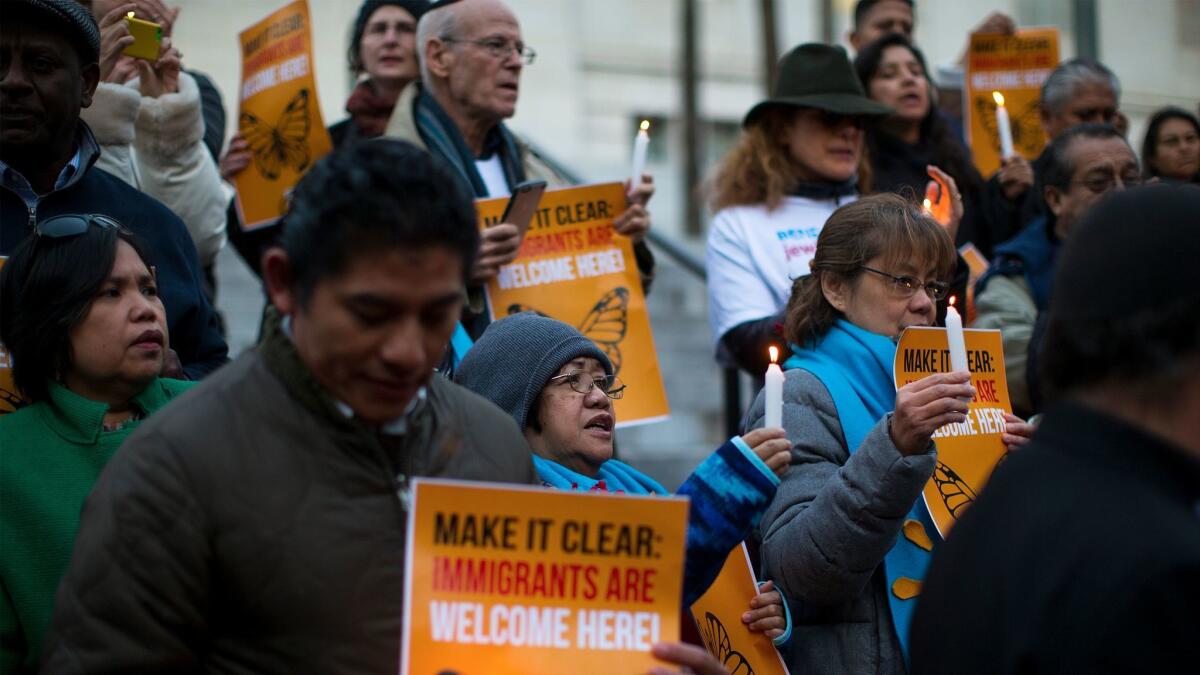Fresno mayor vows his town won’t become ‘sanctuary city,’ bucking California trend

- Share via
President Trump’s plans to crack down on so-called “sanctuary cities” has met with criticism from many politicians around California.
But Fresno Mayor Lee Brand said Thursday that he has no plans for his city to join the sanctuary city movement, which is designed to express support and solidarity for people in this country illegally.
“I’m not going to make Fresno a sanctuary city because I don’t want to make Fresno ineligible from receiving potentially millions of dollars in infrastructure and other types of projects,” he told the Fresno Bee. “My philosophy is to follow the law and to avoid these national culture-war questions.”
Elsewhere in California, many political leaders both in big cities and Sacramento vowed to fight Trump.
Mayor Eric Garcetti told reporters Wednesday that he doesn’t believe the federal government can stop funding Los Angeles and cited the 10th Amendment, which addresses the powers of state and federal governments.
“We feel very strong the legal case is clear,” Garcetti said.
Fulfilling a campaign promise to crack down on so-called sanctuary cities, Trump signed two executive orders Wednesday to begin building a southern border wall, add lockups for detaining immigrants who cross the border illegally, enhance enforcement power for border agents and to strip federal funding from cities that refuse to cooperate with immigration enforcement.
The particulars of Trump’s orders are still being dissected by Los Angeles leaders. But City Council President Herb Wesson told reporters that “the city is going to continue to operate the way it operates.”
Los Angeles will receive about $500 million this fiscal year from the federal government to pay for an array of services including port security, anti-gang programs and senior citizen services.
Mayor Ed Lee of San Francisco said he still supports the its “sanctuary city” status and doesn’t see any changes. Officials in San Jose said much the same thing.
More than 400 jurisdictions across the country have some sort of sanctuary policy, including Los Angeles, San Francisco and about 40 others in California.
There is no neat definition of “sanctuary city,” but in general, cities that adopt the designation seek to offer political support or practical protections to people who are in the country illegally.
For some cities, the sanctuary movement consists simply of encouraging people without legal status to get more involved in government. For instance, Huntington Park has never declared itself a sanctuary city but appointed two people without legal status to a city commission, a move that generated national attention.
Other places, such as San Francisco, adopt far-reaching policies, such as taking steps to cut ties with federal immigration officials and refusing to fully cooperate with them. San Francisco declared itself a sanctuary city in 1989, and city officials strengthened the stance in 2013 with its “Due Process for All” ordinance. The law declared that local authorities could not keep immigrants in custody to be handed over to federal immigration officials if they had no violent felonies on their records and did not currently face charges.
Jessica Vaughan, director of policy studies at the Center for Immigration Studies, a Washington, D.C., think tank that advocates for restrictions on immigration, said cutting off funding to sanctuary cities was a long time coming.
“Money talks,” she said. “But there probably will be some die-hards who will continue to play chicken on this, and they may face other consequences, such as litigation.”
She said it would behoove Trump to expand the types of funding that could be cut off, possibly to include Department of Homeland Security funding.
ALSO
California ‘sanctuary cities’ vow to stand firm despite Trump threats of funding cutoff
Trump’s order to begin wall construction opens wider rift with Mexico
More to Read
Sign up for Essential California
The most important California stories and recommendations in your inbox every morning.
You may occasionally receive promotional content from the Los Angeles Times.
















